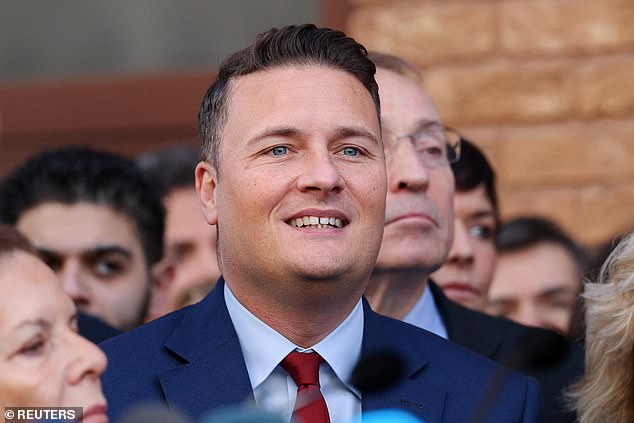GPs have given Wes Streeting 48 hours to resolve a row over how patients book appointments or face another formal dispute.
The threat raises the prospect of further industrial action, such as a cap on daily consultations and a refusal to do routine tests on hospitals’ behalf.
From this Wednesday, GP surgeries in England will be required to keep online forms open for the duration of their working hours for non-urgent appointment requests, medication queries and admin requests.
The change was announced by the Department of Health and Social Care and NHS England in February as part of the new GP contract for 2025/26 in a bid to end the 8am scramble for appointments on the phone.
At the time, officials said the move would be ‘subject to necessary safeguards in place to avoid urgent clinical requests being erroneously submitted online’.
But the British Medical Assocation says these safeguards have not been put in place and no additional staff have been brought in to manage what it predicts to be a ‘barrage of online requests’.
There are fears the change could lead to ‘hospital-style waiting lists in general practice’ and ‘reduce face-to-face GP appointments’, according to the union.
It said this could risk patient safety as staff try to find the most urgent cases, with fears that reviewing online requests will take up too much time.

Health and Social Care Secretary Wes Streeting
But Mr Streeting last night hit back, saying there are ‘clear’ safeguards and it is ‘absurd’ that people can book a haircut online but some GPs still refuse to let patients make appointments in the same way.
The row comes as a new report warns government efforts to improve access to GPs are ‘failing’, leaving patients with worse care, growing inequalities and exhausted staff.
Many surgeries already have a system that allows patients to request consultations online, with staff reviewing these and booking appointments accordingly.
Butt DHSC says there is a lack of consistency, with some surgeries choosing to switch the function off in busier periods.
The BMA’s GP Committee voted last week to enter dispute over the change but this does not formally come into effect until they write to the health secretary – something it says it will do on Wednesday if Mr Streeting fails to take action to avert it.
This would coincide with the end of the Labour Party conference, which is currently taking place in Liverpool.
Dr Katie Bramall, BMA GP committee chairwoman, said the government has broken promises around safeguards, adding: ‘The Secretary of State knows that when these changes come into effect it will likely lead to the creation of hospital-style waiting lists in general practice, reduce face-to-face GP appointments – as we’ll be triaging a barrage of online requests, consequently putting patients at risk of harm as we try to find the urgent cases among the huge pile of unmet patient need that’s out there.
‘We’re not resistant to change but we will be when the safety of patients and practice staff is at risk.
‘The Government has 48 hours to change course, avoid this dispute, and keep to their promises.’
The new report into GP access – published by GP trade magazine Pulse – reveals 55 per cent of GP staff have faced verbal abuse from patients who were frustrated at not being able to secure a timely appointment and 15 per cent have faced physical abuse.
Some 70 per cent of practice staff have experienced a rise in complaints related to these difficulties since Covid.
Meanwhile, nearly half of GP staff (46 per cent) say patients’ biggest priority is seeing the same doctor each time but the report warns Government policies on extended opening hours, diverting more patients to pharmacies and expanding non-GP roles are undermining this.
The number of appointments held in GP surgeries is rising, but satisfaction with access has been in decline for eight years, with fewer patients reporting they got an appointment when they needed one, it adds.
The report – Access All Areas: What general practice staff think about the focus on access in primary care policy – is based on surveys of over 2,000 GP staff, more than 100 interviews and analysis of NHS Digital and GP Patient Survey data.
Jaimie Kaffash, editor-in-chief of GP trade magazine Pulse and the report’s author, said: ‘Patients don’t want fragmented, rushed care – they want a GP who knows them and has time to care.
‘Our research shows high-performing practices succeed by focusing on continuity and quality, not appointment targets.
‘If government is serious about improving access, it must stop reducing general practice to a numbers game.’
Mr Streeting said: ‘It is absurd that in 2025 many patients can’t request appointments online.
‘If you can book a hair appointment online, you should be able to book an NHS appointment too.
‘Many GPs are already offering this service, and now it will be provided to patients across the country.
‘This move – which the BMA agreed to – will support GPs to care for their patients who need non-urgent care.
‘We have agreed clear safeguards, where patients will be directed to phone up or attend in person for urgent appointments. The BMA knows this.
‘This government will always put the interests of patients first, and we will not stand for our NHS being held back in the analogue age.’
The Department of Health and Social Care said one London GP surgery which adopted the approach to online bookings reduced waits from 14 days to just 3 – with 95 per cent of patients seen within a week.
This article was originally published by a www.dailymail.co.uk . Read the Original article here. .

